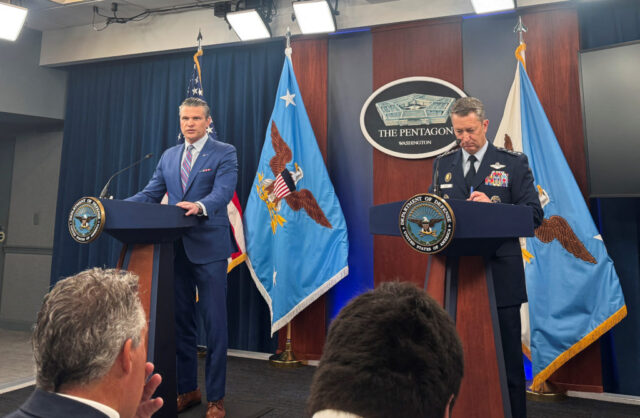Defense Secretary Pete Hegseth and Gen. Dan Caine held a Thursday morning news conference to respond to an early leaked intelligence report suggesting U.S. strikes against Iran likely put the country back mere months.
Watch the full news briefing in our video player above.
President Donald Trump has insisted the U.S. strikes delivered a “devastating” attack and that questioning his assessment of the strike was not only unpatriotic but also makes the pilots who dropped the bombs “very upset.”
READ MORE: Iran’s supreme leader warns U.S. against further attacks in his first statement since ceasefire
Drawing reliable conclusions about the impact of the U.S. strikes is difficult only days after they took place.
Hegseth berates the media
The news conference began with Hegseth, a former Fox News host, criticizing the media for “hunting for scandals all the time.”
He accused reporters of failing to acknowledge “historic moments” like improved military recruiting and increased spending on European defense by U.S. allies on the continent.
WATCH: Trump insists U.S. strikes ‘obliterated’ nuclear sites, says talks with Iran could resume
He then shifted to attacking the “fake news” for reporting on a preliminary assessment about the impact of recent U.S. strikes on Iran.
Trump tunes in
The president seemed to be monitoring the Pentagon news conference, posting about it on social media. “Watch it!” he wrote.
He also baselessly suggested that media outlets that reported on the intelligence assessment “will be firing the reporters who made up the FAKE stories.”
Trump has been fixated on coverage of the U.S. strikes, which could determine how American voters view his decision to get involved in the latest war in the Middle East.
Hegseth minimizes intelligence assessment
The defense secretary minimized the importance of a preliminary intelligence assessment that concluded U.S. strikes on three Iranian nuclear facilities had damaged but not permanently destroyed them.
Hegseth scolded the media for “breathlessly” focusing on an assessment from the Defense Intelligence Agency even though the DIA is part of the Defense Department.
READ MORE: New U.S. intelligence report suggests Iran’s nuclear program only set back by months after strikes
He said the assessment was preliminary and had not been coordinated with other agencies in the intelligence community. He said other intelligence assessments have been more bullish in their assessments on damage of the sites.
Military official describes Iranian missile attack on U.S. base
The top U.S. military official recounted in detail the Iranian missile attacks on a U.S. military base in Qatar.
The description from Gen. Dan Caine, the Joint Chiefs of Staff Chairman, appeared aimed at shifting the conversation from questions about political leadership and overall strategy to heroic narratives about individual U.S. service members.
WATCH: Jon Finer analyzes aftermath and potential consequences of U.S. strikes on Iran
He said roughly 44 American service members responsible for defending the entire base were present as rounds of Patriot missiles were launched. Caine says Qatar joined in the successful American defense of what he called the largest single Patriot engagement in U.S. military history.
Hegseth targets ‘biased leaks to biased publications’
Military officials have said it will take time to fully understand the impact of U.S. strikes on Iran, and there was little in the way of new information about their damage.
But Hegseth said they decided to hold Thursday morning’s news conference because “there was a great deal of irresponsible reporting” based on a preliminary intelligence assessment. He criticized “biased leaks to biased publications.”
“If you want to know what’s going on at Fordo, you better go there and get a big shovel,” he said.
WATCH: Fragile Israel-Iran ceasefire holds as Trump lashes out at both sides
The Pentagon briefing included a detailed narrative about military tactics and hardware. However, it was short on information about how much the attack setback the Iranian nuclear program.
It’s unclear how quickly Iran could repair the damage or rebuild its capabilities elsewhere. There have also been questions about whether Iran was able to move its enriched uranium before the U.S. strikes.
Hegseth said he didn’t think that happened.
“I’m not aware of any intelligence that I’ve reviewed that says things were not where they were supposed to be — moved or otherwise,” he said.
Support PBS News Hour
Your donation makes a difference in these uncertain times.

















































